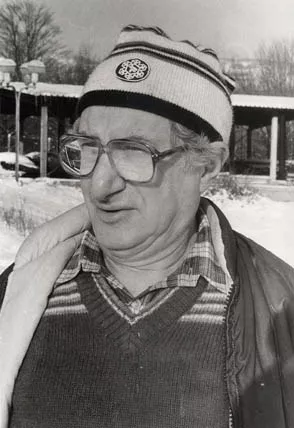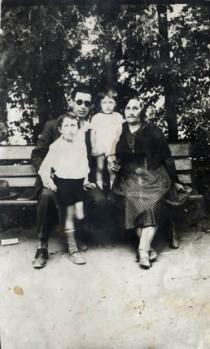Here I am on an excursion in the village of Ribaritsa in 1988.
My job as a teacher was very light, but low-paid. And I loved designing, so I quit the technical school and started work in 'Vodproekt' in 1969. I was chief engineer of the Machine department - we prepared designs for dams, pumping stations, pressure pipelines. My employers offered me to go and work in Cuba. So, in January 1979 I left for Cuba with my son. My daughter stayed in Bulgaria to study, she was already 18 year old and lived by herself. My brother and his wife helped her. I worked in Cuba for three years and a half. I was in a plant producing hydraulic installations for dams and pumping stations. I was happy there. I got along very well with the Cubans. I can say a lot about Cuba. At one time the Mexican Foreign Minister arranged a meeting between the USA State Secretary and Fidel Castro's adviser. The Americans said that they would lift the economic blockade, turn over Guantanamo and restore diplomatic relations with Cuba if the country withdrew its forces from other countries and stopped interfering in their internal affairs. Cuba had military missions in Angola, Mozambique and other places. But the Cubans declined and there was a lot of coverage on that.
Fidel Castro organized a demonstration. He spoke three or four hours and said that he did not make deals with the revolution and his ideas. So, the American Congress adopted a decision for serious measures against Cuba and was inclined to attack. Cuba raised into combat readiness all its arms on the coasts and mobilized half the men. One morning I went to the plant and the director told me that we were going to the site. We produced hydrotechnical installations for dams and pumping stations and we hired assembly brigades to install them. We got into the Volga [a car manufactured in the USSR] and left. After a while we reached a military base. The director told them our names and they let us in. I am a foreigner, but they did not want to see my documents, nor did they ask me anything. A lieutenant colonel welcomed us and showed us their lines or armaments - tanks, cannons. He told us that we should cover them so that the Americans would not see them. I said, 'Okay, what materials do you have?' We had never done anything like that before. 'We do not have any materials,' the army official said, 'Take materials from your plant.' There were such materials in our plant. So, the director, who was a turner, said, 'Well, Avram, you will be using tubes.' 'But the tubes are for water. We need planks for the supporting structure,' I said. 'Well, we do not have any planks, so you will make it with tubes,' they said. The next day we had to start working.
I was wondering what to do the whole night. We had rims and we soldered the rims to the tubes to make something like a supporting plank. The next day we loaded the tubes, took the brigade and started working. We worked for one month - without designs. They gave us food there, I got home dirty and dead-tired. Meanwhile my daughter married and had a baby. My son graduated the Bulgarian school in Cuba and returned to Bulgaria to do his military service. My daughter needed me - she was studying machine engineering with a baby on her hands. My son was a soldier and no one had the time to visit him. So, one day I told the director that I wanted to go back to Bulgaria. We went to the site and he said to the lieutenant-colonel, 'You know, the Bulgarian wants to go home.' And he said, 'No way, he knows too much. He will go nowhere until the end of the war.' It was the winter of 1982. I told them, 'I am alone here,' and the lieutenant-colonel said, 'We will find you a wife!' 'But I also want a lover,' I answered and the lieutenant-colonel burst out laughing, 'You have become a real Cuban!' In Cuba everyone has a wife and a lover. The Cubans are warm people, with a sense of humor, but life is hard and they are isolated. But the war did not take place and I returned to Bulgaria.
I came back in April 1982 and started work in the Hydrotechnics and Melioration Institute. I headed a section for the design and assembly of installations for automation of the water distribution. The work was interesting and creative. My colleagues were nice people and we achieved some very good results - we produced a lot of inventions and patented some of them.





























